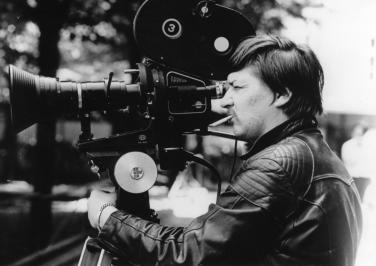This cycle is an exciting journey to Fassbinder's work through 58 sessions, in which 35 feature films and the two short films directed by the German filmmaker will be screened.

Rainer Werner Fassbinder lived and filmed fast. For Jean-Luc Godard, one of the filmmakers that most admired the director of The Law of the Strongest (1975), Fassbinder did the essentials of the New German Cinema on his own. It may be exaggerated to afirm something like that, specially because Wim Wenders or Werner Herzog also contributed significantly to the creation of an innovative German cinematography in the 1970s. But the rage and forcefulness with which Fassbinder built his filmography is unparalleled in European cinema. He made thirty-nine films between 1969 and 1982, plus two previous short films in 1966. He also directed two television series and one of them, "Berlin Alexanderplatz" (1980), is today a benchmark of European cathodic fiction.
In an urgent and direct style, increasingly skeptical, and always working with a stable team of interpreters emerged from his own theater company, Fassbinder built an incisive discourse on class difference, state terrorism, sexual identity and loving relationships of dependence and submission, and also dedicated a trilogy to post-war Germany. Titles such as The Bitter Tears of Petra von Kant (1972), We all call ourselves Ali (1974), Journey to the happiness of Mama Küsters (1975), The Marriage of Maria Braun (1978) and Lola (1981) define an unbearable style, an angry download against social norms and film conventions.
This cycle is an exciting journey to Fassbinder's work through 58 sessions, in which 35 feature films and the two short films directed by the German filmmaker will be screened, as well as his two television series. This programme is complemented by other sessions named Fassbinder + Plus, in which 17 films related in various ways with Fassbinder and his work will be screened, films that inspired him and others that emerged under his influence. Some lectures will also be programmed in order to reach a closer approach to the figure of a singular filmmaker.
PROGRAMME
2 October, 19:00 El matrimonio de Maria Braun
9 October, 19:00 El vagabundo El pequeño caos + El amor es más frío que la muerte
16 October, 19:00 Los dioses de la peste
18 October, 19:00 Lecture: Fassbinder en el contexto del Nuevo Cine Alemán (Violeta Kovacsics) | 20:00 Une jeunesse allemande
23 October, 19:00 Katzelmacher
30 October, 19:00 ¿Por qué le dio un ataque de locura al señor R.?
3 November, 19:00 ¿Qué he hecho yo para merecer esto?
6 Novemer, 19:00 Rio das Mortes
13 November, 19:00 Kafetegia
20 November, 19:00 Whity
27 November, 19:00 El viaje a Niklashausen
4 December, 19:00 El soldado americano
11 December, 19:00 Cubalibre + Atención a esa prostituta tan querida
15 December, 19:00 Vivre sa vie
18 December, 19:00 Zulatzaileak Ingolstadten
25 December,19:00 El mercader de las cuatro estaciones
27 December, 19:00 Barbara
1 January, 19:00 Mala noche
2 January, 19:00 Edward II
3 January,19:00 “Ocho horas no hacen un día” (pas / cap: 1 – 103 min) (1 entrada)
4 January, 19:00 “Ocho horas no hacen un día” (pas / cap: 2-3 – 194 min) (1 entrada)
5 January 19:00 “Ocho horas no hacen un día” (pas / cap: 4-5 – 181 min) (1 entrada)
8 January 19:00 Las amargas lágrimas de Petra von Kant
15 January, 19:00 Askatasuna Bremenen
22 January, 19:00 Fassbinder – Lieben ohne zu fordern
25 January, 19:00 El mundo conectado
29 Janaury, 19:00 Nora Helmer
5 February, 19:00 Martha
12 February, 19:00 Un chant d'amour + Txori bat alanbrean bezala
19 February, 19:00 Todos nos llamamos Ali
21 February, 19:00 All That Heaven Allows
22 February, 19:00 Far from Heaven
4 March, 19:00 Effi Briest
11 March, 19:00 La ley del más fuerte
17 June, 19:00 Beldurrari beldurra
1 July, 19:00 Viaje a la felicidad de mamá Küsters
8 July, 19:00 Mutter Krausen’s Fahrt ins Glück
8 August, 19:00 Solo quiero que me améis
19 August, 19:00 El asado de Satán
2 September, 19:00 Txinatar erruleta
